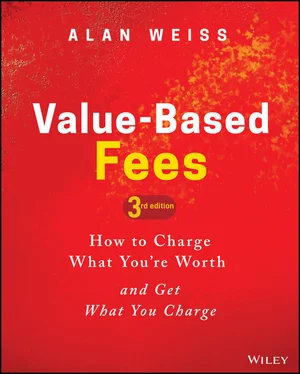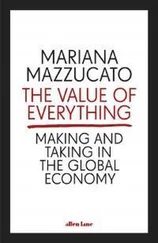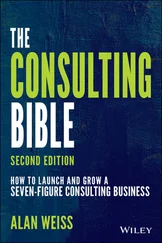2 The buyer will want to minimize time, requiring the consultant to use fewer resources, make fewer visits, or narrow the scope. All of this may be highly detrimental to the quality of the investigation.
3 The buyer will want to minimize hourly rates, which often forces the consultant to make concessions. This, in turn, has two consequences: it endangers the “magic formula” based on the consultant's earnings needs calculations, and it tells the buyer that the consultant has padded the fees and prompts even the most benign of buyers to wonder, “How low can this person go?” (I can name that tune in two notes.)
For legitimate ethical interests, for the client and the consultant, time-and-materials billing is problematic and compromising. Not usually compromising. Always compromising.
LIMITING PROFITS, OR WHY NOT JUST FORGET DOMANI?
The very worst aspect of billing based on time is the limitation it places on profitability. I've never believed in business plans, for myself or for my clients, because the danger with a plan is that you might achieve it . 4
Consultants—and this applies particularly aptly to solo practitioners—take extraordinary business risks. Why shouldn't they reap the commensurate rewards? The only intelligent business proposition is to attempt to maximize profitability. Note that I'm not saying “maximize business,” because that might lead to harder work, longer hours, and an infringement on one's life balance. But I am saying “maximize profits” because we wouldn't be very good businesspeople or consultants if we didn't.
Therefore, why create a straw man of an artificial business plan that delimits growth? (Have you ever really seen managers in October still managing against a plan created the prior June?) The mantra-like focus on “increasing business by 20 percent” or “gaining five new coaching clients” or “gaining 5 percent in the Canadian marketplace” is rather pointless if, in fact, the conditions were such that you should have increased by 40 percent, gained 12 new coaching clients, or become one of the major players in the Canadian market.
An hourly fee is a similar delimiting factor. You will always be at the mercy of the “cap” in your marketplace. (The best New York attorneys, senior partners, working for the best clients, are hard-pressed, realistically, to go much above $650 an hour—despite the $1,000-per-hour ego trips—and they represent a small fraction of all attorneys, whose average income is about $165,000 in the United States in 2020. 5 ) And the larger firms with junior help will always be able to undercut you with junior rates.
If I estimate that I can work 40 weeks a year and that I'll be “billable” an astonishing 80 percent of the time, that provides me with 1,280 hours (80 percent times 40 equals 32 times 40 hours in a workweek). At a New York lawyer's healthy fee of $500 an hour, that comes to $640,000—not a bad year's work (although not anywhere close to the best solo practitioner consultants). However, a more reasonable rate is probably half that, resulting in $320,000, and a more reasonable billing percentage might be 60 percent, not 80 percent, resulting in $240,000. Now that's still not exactly shabby, but is that the number that will support your lifestyle through marriage, children, tuition, retirement, care for elderly parents, vacations, investments, unexpected emergencies, and the pure joie de vivre of it all?
I think not. I tell my mentorees all the time that $100,000 ain't what it used to be. Refer back to the actual 2020 average stated above.
It is absolutely crazy to adapt any billing scheme that can place a cap on your income. Time unit billing does just that. The only good reason for deliberately making less money is the urge to work less, and even there, I have a hard time believing that you must also make less money if you're smart.
Architects are famous for their hourly billing, and they are probably the only profession that had a decrease in net income over the boom years of the recent past. 6 They were done in by a number of factors, all within their own means to control, but particularly these:
Hourly billing, which declined as hours declined due to competition from general contractors, engineers, and others who freely “poached” on architects' turf
Fierce competition and resultant pressure on prices caused by a plethora of architects, not unlike today's burgeoning number of consultants (In Duluth, Minnesota, no less, a focus group told me, “Stop any three people on the street, and two of them are architects.” I immediately termed this the “Duluth architect syndrome.”)
An absence of negotiation skills with educated buyers, meaning that the only variable the architects would manipulate was their own hourly fees, and the direction was always downward
Blindness to the real profit margins caused by love of the profession (Every architect wants to build a cathedral and keeps waiting for that contract, even though architects are overwhelmingly engaged in house extensions and garage additions. Consequently, they are always too willing to take on unprofitable projects to keep them busy “until the real thing comes along,” and they tell you that they'll make up the shortfall “on volume.”) 7
Consultants have been little better. The focus on “billable time” has driven both independents and large consulting operations to focus on work, use, and task, on the assumption that something is better than nothing—we can't let all those billable hours be spent sitting here at a desk, after all. This mentality severely limits profits because, as happened with the architects, it forces one to do work that shouldn't be undertaken at rates that can't be countenanced. Something is not better than nothing. Some things are worse than nothing because they cost you money.
Billable hours, and the formulas on which the more methodical base them, are pernicious and insidious dampeners of profit. Moreover, the need to be competitive on such a commodity ultimately forces downward pressure on all time unit rates. So in the tactical application—fees based on time for the project—the consultant will suffer from continuing downward pressure when played off on others offering the same commodity pricing, and in the strategic sense—using time units to create a year's living expenses—there will never be enough hours or a high enough rate to dramatically improve income.
Aside from their tactical and strategic failures, time-based fees are great!
WHY LAWYERS AND CPAS DO SO POORLY
The problem with professions that use time-and-materials charges is that the practitioners have no real appreciation for their own value and hence cannot adequately (or dramatically) convey their value to the client. Let's look at some cases in point.
Lawyers have finally understood that their ultimate worth is not in their activity but in their results. Therefore, contingency fees have begun to proliferate. It's not uncommon for a law firm to take 30 percent or 40 percent (or even more in some conditions) of the total client settlement.
The problem is that the attorneys often take this, as they say at the craps tables in Las Vegas, as “betting on the come.” This means that if they lose the case, they not only fail to collect any fee but are also out their legitimate legal expenses. This is high-stakes gambling, and it leads to at least four ethical quandaries:
1 Pushing the case beyond the plaintiff's patience or commitment, because, in for a dime in for a dollar, it's cheaper to invest more on the hope of a possible victory than to simply abandon all prior investment
2 Avoiding early settlements in the hope of hitting the jackpot of a huge jury decision or a more favorable last-minute settlement in the face of a damaging trial
Читать дальше












